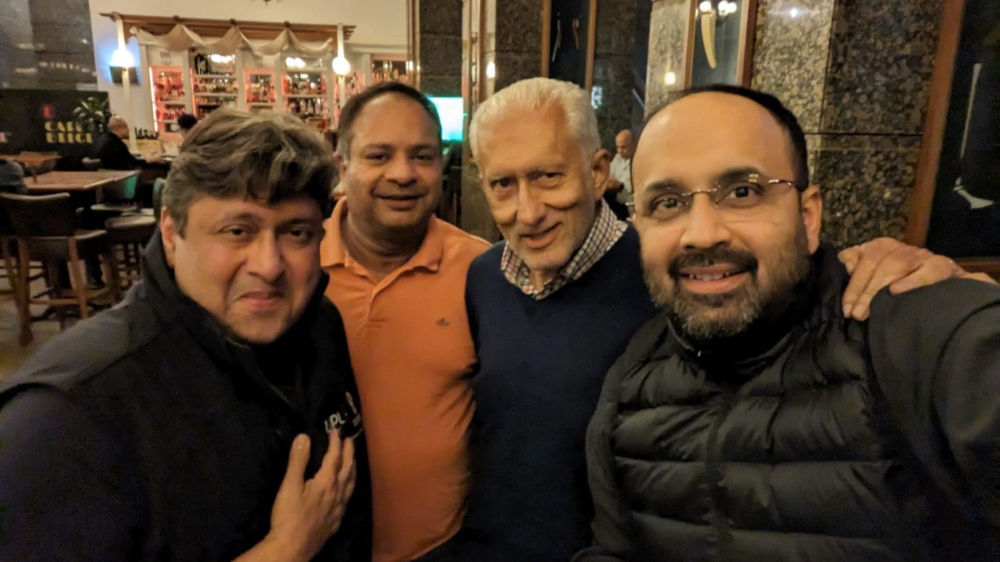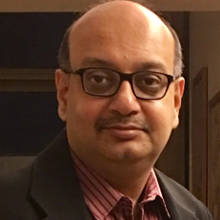[Tino (Anupam) Puri with McKinsey alums Manish Kejriwal (extreme left), Ashu Garg (in an orange tee) and Sumit Jamuar]
Tino 'Anupam' Puri, McKinsey’s first Indian hire and a revered figure in global consulting, passed away on Saturday. He would have turned 80 this October.
A scratch golfer and the uber-suave Oxonian son of an Indian diplomat, Tino was McKinsey’s first “brown hire.” “He persuaded The Firm that its blue-blood clients would accept subcontinentals, opening the door to other Indians,” wrote his friend and former colleague Amar Bhide in a moving tribute on LinkedIn. Rajat Gupta followed in 1975. “The trickle became a flood—at McKinsey and its hitherto lily-white rivals.”
In the early 1990s, when he was tasked with building McKinsey’s India practice, Tino convinced the top brass that it had to be led by local talent. He bet on freshly minted MBAs from IIM Ahmedabad and IIM Calcutta—young professionals who would go on to shape not just consulting, but also leadership across executive search, investment banking, and corporate India.
Tino also played a pivotal role in mentoring Rajat Gupta, who would go on to become McKinsey’s first Indian-born managing director. In a 2007 interview in ET that he did with my colleague Shishir Prasad and I, Tino reflected on why Gupta earned such deep trust within the firm. “There were rumours of Rajat and the ‘Indian mafia’ at McKinsey that surfaced from time to time. But such allegations never stuck,” he said. “Rajat never had time for idle chatter. With him, there were no wheels within wheels. You got exactly what you saw.”
Tino admired how lightly Rajat wore his success—his Connecticut home, he noted, was “like a public dharamshala” for colleagues and friends. “He had extraordinary stamina. I need downtime after a long day—not he,” Tino said, half in awe, half amusement.
Even though Rajat’s fall from grace shocked admirers around the world, Tino had seen it coming. While he never spoke publicly, he privately voiced concern about the company Rajat had begun to keep—particularly Raj Rajaratnam of the Galleon Group, and Anil Kumar, the disgraced McKinsey partner and fellow IIT-Delhi graduate.
Even at the height of Rajat’s influence, Tino is said to have frowned upon his protege’s constant efforts to court the media and build a personal profile—something that ran counter to the values of quiet integrity that he himself embodied.
When Rajat Gupta was sentenced in October 2012 to two years in prison for leaking confidential boardroom information, Tino remained publicly silent. But those close to him say he was quietly disapproving of Gupta’s plan to publish a memoir.
When Mind Without Fear was eventually released in 2019, it sparked a brief media blitz. I interviewed Rajat at the time for Founding Fuel, where it became clear that the memoir was a valiant—but ultimately futile—attempt to prove that the case against him had been unfounded and motivated.
Still, some—including Tino—felt that a different kind of response might have resonated more deeply. What was missing, they believed, was a moment of honest reflection. Contrition in this case didn’t mean admitting guilt for guilt’s sake—it meant acknowledging the damage done, and choosing humility over vindication. As Martha Stewart did in the aftermath of her own legal troubles, a quieter acceptance might have helped rebuild trust—not just with the world, but perhaps within oneself.
That quiet moral compass—rooted in self-awareness, restraint, and integrity—was what Tino stood for.
His passing has stirred deep emotion among McKinsey alumni from that era, many of whom saw Tino as a mentor and role model. Ramesh Mangaleswaran, senior partner emeritus, recalled: “We were taught not to compromise. To hold on to our point of view. And not do things that seemed expedient.”
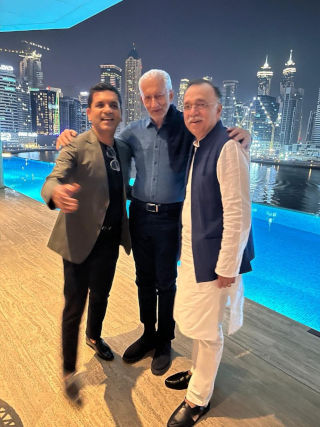
[Tino with Pramath Sinha and Sunish Sharma, Dubai reunion Feb 2023]
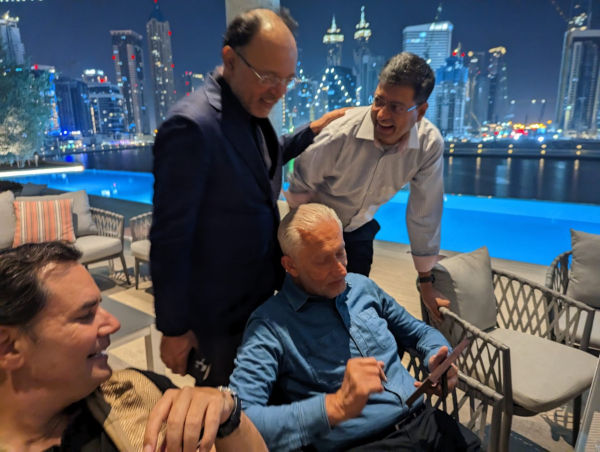
[Tino (seated), surrounded by Noshir Kaka (extreme right), Gautam Kumra (centre) and Vivek Pandit (extreme left) at the Dubai reunion in February 2023]
One such community, the McK INO 90s WhatsApp group—a tight-knit alumni circle from that generation—saw an outpouring of tributes and memories. (The 135 odd alums in the group include Rajan Anandan, Ireena Vittal, Anjali Bansal, Pulak Prasad, Ashu Garg, Sumit Jamuar, Jayant Sinha, Laxman Narasimhan, Vipul Tuli and Adil Zainulbhai, among others.)
“This is the first time we’ve lost someone in the group,” said Pramath Sinha, founder and trustee of Ashoka University. “And it had to be Tino.” He shared images from the group’s most recent biannual reunion, held in Dubai in February 2023, which Tino attended with his wife Rajika (Pin).
Pramath recalled his first encounter with Tino. In 1993, as a young consultant with McKinsey’s Toronto office, he was sent to India to conduct a study on newsprint demand for a Canadian paper company. Before leaving, his mentor Tsun-yan Hsieh had urged him—repeatedly—to meet Tino. “I didn’t understand the urgency,” said Pramath.
But as soon as he stepped out of the elevator on the top floor at The Oberoi in Mumbai, where McKinsey’s India office was located, he ran into Tino—who promptly invited him to lunch at the ground-floor cafeteria. “On the way there, he asked me what I was doing in Toronto. He said, ‘We need people like you here in India.’ Tino was such a talent magnet.” Pramath would shuttle between India and Canada for two years before moving permanently in 1995.
He also recalled Tino’s formidable presence at a strategy meeting in London with Rupert Murdoch and the top brass at News Corp. “His deep baritone, gravitas, and deliberate mannerisms made clients instinctively trust him.”
Tino’s early client work in India focused on the country’s biggest business families—the Tatas, Mahindras, Godrej, RPG Group, and others. He helped build relationships that would anchor the firm for decades.
In the mid-1990s, McKinsey hosted a landmark session at The Oberoi in Mumbai led by three McKinsey partners Mehrdad Baghai, Stephen Coley and David White on the firm’s much-vaunted Three Horizons Growth Model. Every major Indian conglomerate was seeking new engines of growth. The room was packed with literally the who’s who of India Inc. The display of influence and intellectual firepower was stunning.
McKinsey alums like Ramesh remember Tino fiercely backed his young team. When clients pushed back on consultants flying home every weekend—air travel was expensive—he held firm. They needed the break, he insisted.
Bhide recalled being just 24 when he submitted a report advising GE against acquiring Marathon Oil, despite Morgan Stanley’s strong lobbying. “Tino backed me to the hilt. He must’ve been 34 at the time. We prevailed. GE remained a client.”
Keeping the flock together wasn’t always easy. In 1995, at an offsite in Goa, there was growing anxiety among senior team members—many unsure if they would make partner. Tino tried to reassure them, telling the group that each of them would get there in time. And then he quietly made sure of it. With support from senior leaders like Ashok Alexander and Kito de Boer, Tino invested time mentoring the next generation of talent. “We were tracking the ratios,” Pramath said. “Globally, one in six made it to partner. But Tino knew India was different. He saw its limitless growth potential—and he was right.” Today, every major global consulting firm has over 100 partners from its India practice.
Tino’s ability to spot and nurture talent had a lasting ripple effect. In 1994, he hired a young graduate from JBIMS—Noshir Kaka—into the India office. That recruit would go on to become managing director of McKinsey India, and today serves on the firm’s global board. Reflecting on his mentor’s passing, Noshir said:
“Tino has been a founder, mentor, and inspiration to a generation of colleagues within and beyond our Firm. We are deeply saddened by his loss.”
Tino’s imprint on McKinsey’s India practice wasn’t just structural—it was deeply personal. Gautam Kumra, now Asia Chairman at McKinsey, still recalls the moment he first encountered Tino on campus at IIM Ahmedabad in 1992.
“No one had heard of McKinsey or management consulting then,” he wrote. “But by the end of his talk, everyone wanted to be hired. I was in awe of him from day zero.”
Gautam would later experience Tino’s values in action—his commitment to dissent, meritocracy, and mentorship. “He debated with me as an equal, even though I was the most junior in the room.”
But what stayed with him most was Tino’s generosity of spirit. After a failed client presentation early in his career, Gautam feared the worst. But Tino called him that weekend just to check in. “He told me I was better than he had been at the same age. That gave me the confidence to bounce back.”
Tino’s ability to attract high-potential talent extended well beyond campuses. In 1995, Manish Kejriwal, now founder and managing partner at Kedaara Capital, made a bold decision that would change the arc of his career. “Tino Puri was one of the main reasons I returned to India,” he wrote in a LinkedIn post last year. “He had just set up the India office of McKinsey & Company and being a part of that founding team was a phenomenal experience—even though many wondered why a young MBA would walk away from opportunities in the US.”
It was yet another example of how Tino inspired others not just with vision—but with conviction.
The lineage of leadership Tino helped seed—in India and across the firm—remains one of his most profound legacies.
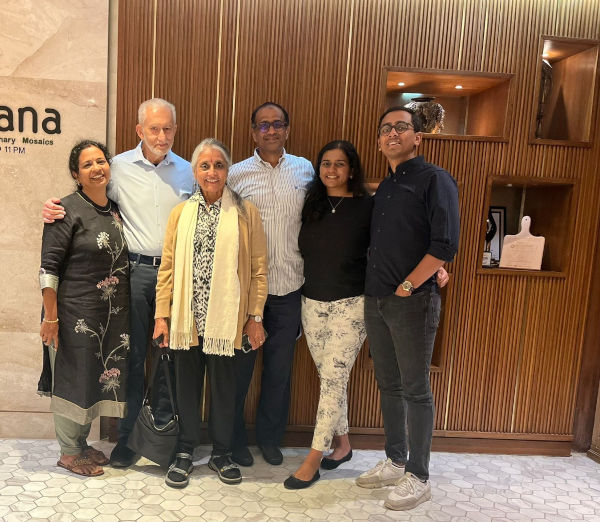
[In early 2023. Tino and his wife Pin travelled to Chennai to attend the music and dance festival season. Seen here with Ramesh Mangaleswaran, his wife Meenakshi Ramesh and their son Siddharth and daughter Shivani.]
Always impeccably dressed, Tino had exquisite taste—spanning painting, music, and dance.
His wisdom and integrity earned him board seats at Dr. Reddy’s, Mahindra & Mahindra, ICICI Bank, and Godrej Consumer Products.
GV Prasad, vice chairman of Dr. Reddy’s, stunned by the news, summed it up best in a call with Ramesh: “They don’t make them like they used to.” His was a rare blend of intellect, elegance, and conviction—one that shaped a generation and left behind a blueprint for leadership that endures.
Tino’s impact wasn’t just measured by the positions he held—but by the people he shaped. As Ashu Garg, a former McKinsey consultant and now a Silicon Valley-based investor, reflected:
“I’ve been reflecting on Tino’s legacy... and my biggest takeaway is that we are all a part of his legacy—and we all have the opportunity to be more like Tino.”
“When most of us met him, he was in his 50s—like many of us now. And 30 years later, there are nearly 100 mentees in this group celebrating him. Hopefully, each one of us can build our own community of 100, through whom we will continue to live and have impact.”
In the end, Tino didn’t just build institutions. He built people. And that may be his most enduring legacy.
(This article was updated to reflect how Tino thought of Rajat Gupta's actions.)
